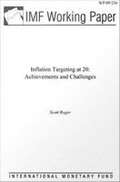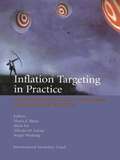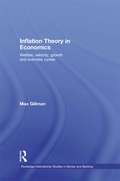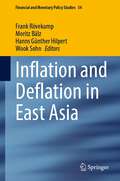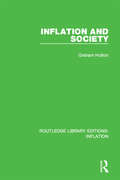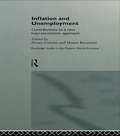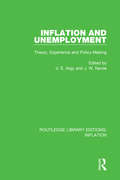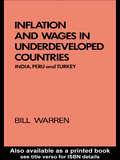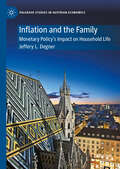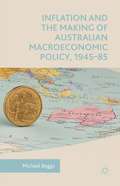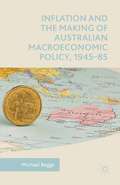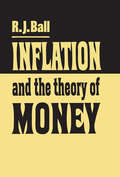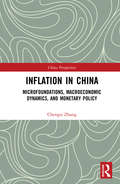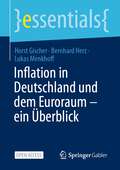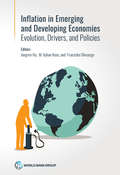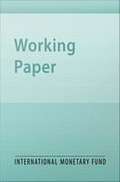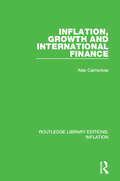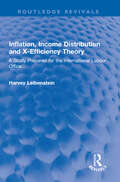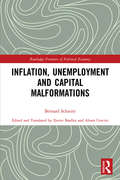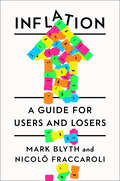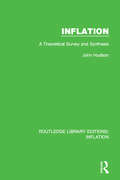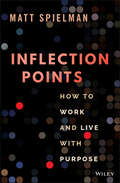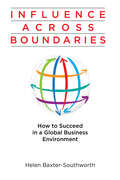- Table View
- List View
Inflation Targeting at 20: Achievements and Challenges
by Scott RogerA report from the International Monetary Fund.
Inflation Targeting in Practice
by International Monetary FundThere is widespread and growing consensus that the single most important goal of monetary policy should be the pursuit of price stability. To reflect this an increasing number of central banks have been granted independence and charged with the exclusive objective of controlling inflation. In January 1999 the Central Bank of Brazil decided to adopt an explicit inflation targeting approach. To inform this process the Bank and the International Monetary Fund held a seminar in Rio de Janeiro on 3-5 May 1999, from which this publication arose. The seminar's purpose was to analyse the experience of countries that have been operating under an inflation targeting framework, and to identify and review the steps that countries like Brazil should consider in adopting such a framework, to enhance the chances of its success. Experts from 10 central banks joined with officials from the Central Bank of Brazil and the IMF for an in-depth examination of recent experience, including aspects of the design and operation of inflation targeting in both developed and emerging economies. This report brings together summaries of the presentations given at the seminar, and presents a concise guide to the theoretical considerations and practical aspects that are key in assessing the benefits and costs of adopting an inflation targeting monetary strategy.
Inflation Theory in Economics: Welfare, Velocity, Growth and Business Cycles (Routledge International Studies in Money and Banking #Vol. 53)
by Max GillmanThese essays bring together a progression in monetary theory. The major theme that runs through all of the chapters is that in order to do monetary economics well in general equilibrium, it helps to have a good money demand underlying the theory. A proper underlying money demand sets up arguably the best foundation from which to make extensions of monetary economics from the basic model. At the same time that money demand is modelled, this also “endogenizes” the velocity of money. This has been a challenge in the literature that these essays solve and then use to extend basic neoclassical growth and business cycle theory. Solving this problem, in a way that is a natural, direct, and “micro-founded” extension of the standard monetary theory is the first major contribution of the collection. The second major contribution is the extension of the neoclassical monetary models, using this solution, to reinvigorate classic issues of monetary economics and take them to the frontier.
Inflation and Conflict in Iraq: The Economics of Shortages Revisited
by Udo Kock David A GrigorianA report from the International Monetary Fund.
Inflation and Deflation in East Asia (Financial and Monetary Policy Studies #54)
by Frank Rövekamp Moritz Bälz Hanns Günther Hilpert Wook SohnIn light of the deflationary trends following the 2008/2009 financial crisis, as well as the return of inflation triggered by the COVID-19 pandemic and the war in Ukraine, this book offers insights into price stability issues in various East Asian countries. Leading scholars from the fields of economics and law as well as central bank practitioners present case studies on Japan, Korea, Singapore, and Taiwan. The contributors address topics such as quantitative monetary easing, the role of global and domestic shocks on inflation dynamics, and other monetary policy issues. In doing so, the book goes into detail about the individual forces and effects of deflation and inflation and compares the Asian experience with that of the Eurozone.
Inflation and Society (Routledge Library Editions: Inflation)
by Graham HuttonOriginally published in 1960, this book examines how inflation as a policy has come about in modern democracies, how ti works, how to avoid it and at what cost. In non-technical terms it explains what inflation does, both to society and its individual elements, to weaken and hamper democracy. Including examples from the UK, Germany, France, Scandinavia, the USA and the former Soviet Union this volume examines inflation at work in widely differing communities since Roman Times to the late twentieth century.
Inflation and Unemployment: Contributions to a New Macroeconomic Approach (Routledge Studies in the Modern World Economy)
by Mauro Baranzini Alvaro CenciniThis work challenges traditional monetary theory by focusing on the role of banks and provides a new insight into the role played by bank money and capital accumulation. An international team of contributors reappraise analyses of the inflation and unemployment developed by Marshall, Keynes and Robertson. This volume is published in association with the Centre for the Study of Banking in Switzerland.
Inflation and Unemployment: Theory, Experience and Policy Making (Routledge Library Editions: Inflation)
by J. W. Nevile V. E. ArgyOriginally published in 1985 and contributed to by internationally renowned economists, this volume discusses theoretical issues and country-specific experiences to review the underlying causes of the stagflation of the 1970s and early 1980s, as well as summarizing the kinds of macro-policies that were adopted to deal with the stagflation.
Inflation and Wages in Underdeveloped Countries: India, Peru, and Turkey, 1939-1960
by Bill WarrenPublished in the year 1977, Inflation and Wages in Underdeveloped Countries is a valuable contribution to the field of Economics.
Inflation and the Family: Monetary Policy's Impact on Household Life (Palgrave Studies in Austrian Economics)
by Jeffery L. DegnerThis book provides unique insight into the relationship between economics and family life. Taking ideas from the Austrian school of economics’ understanding of monetary theory, it delves into the drivers of family formation, fertility, and family disintegration, with a particular focus on the role of inflation and inflationary policy. By placing questions surrounding family life within a political economy setting, the impact of relative price changes, inflation culture, and specific monetary policies on the role and structure of the family are highlighted. This book offers a nuanced and robust understanding of the economic causes of the deinstitutionalization of traditional family life. It will be relevant to students and researchers interested in monetary economics and the economics of the family.
Inflation and the Making of Australian Macroeconomic Policy, 1945–85
by Michael BeggsInflation and the Making of Australian Macroeconomic Policy, 1945–85.
Inflation and the Making of Australian Macroeconomic Policy, 1945–85
by Michael BeggsIn the decades after World War II, inflation undermined the aspiration for full employment in Australia. This book tells the story of how the Australian state was shaped by the confrontation with monetary instability: a pre-history of neoliberalism.
Inflation and the Theory of Money
by R. J. BallMartin Bronfenbrenner in the Journal of Finance had this to say when the book was first released "A thoughtful, scholarly, and systematic treatise on the economics of inflation. If this reviewer were asked to hang a course on inflation theory upon one single text, it would almost certainly be this one."The principal concern of this book is to set out the elements that enter into problems of analyzing inflation. This detailed, readable review of contemporary theory on the problems of inflation fills an important gap in the literature on macro-economics that: 1) assesses the implications of inflationary processes for economic policy; 2) synthesizes a general framework within which to illustrate inflationary processes; 3) reconciles the approaches of "demand inflation" and "cost inflation"; and 4) analyzes the determination and behavior of the general price level in an exchange economy.The first part of the book reviews neo-classical and "Keynesian" type models of the closed macro-economy, analyzes determination of the general price level, and introduces a restatement of conventional employment theory with emphasis on the general price level.The second part considers the problems of price and wage determinations and the demand for money in more detail, synthesizing the analyses into a model of the macro-economy and discussing the implications of this model and the preceding analysis for economic policy. Describing alternative approaches to the theory of inflation, each of which has resulted in partial theories, the book avoids fragmentary explanations by setting the entire discussion in the context of a macro-economic general equilibrium framework.
Inflation in China: Microfoundations, Macroeconomic Dynamics, and Monetary Policy (China Perspectives)
by Chengsi ZhangInflation plays a central role in macroeconomic and financial policy regulation, and its dynamic formation has gradually become a popular research topic in this field. This book comprehensively studies the dynamic mechanism of inflation in China from the perspective of New Keynesian economics. By combining the dynamic trajectory of price changes since China's reform and opening-up under Deng Xiaoping as well as the underlying economic operating characteristics, the book deploys a multifaceted approach to understand the mechanism of inflation dynamics. The author explores the microfoundations of inflation dynamics, and underlines their importance in the context of modern monetary policy. In particular, he builds upon the traditional New Keynesian Phillips curve to include factors of globalization and financialization within the inflation formation regime of modern China. As the book explores the dynamic mechanism of China's inflation from different perspectives including inflation cycle theory, price index internal conduction, price index chain transmission, capital rotation, and industry inflation mechanisms, international readers will gain a full understanding of China's inflation, monetary policy, and economy.
Inflation in Deutschland und dem Euroraum – ein Überblick (essentials)
by Horst Gischer Bernhard Herz Lukas MenkhoffDer vorliegende Open-Access-Band analysiert die relevanten ökonomischen Zusammenhänge der Inflation in Bezug auf die Entstehung und die Folgen von nachhaltigen Steigerungen des Preisniveaus einer Volkswirtschaft. Nach einer langen Periode stabiler Preise ist die Gefahr einer dauerhaften Inflation unerwartet wieder in den Blickpunkt von Wirtschaft und Politik geraten. Begleitend werden die Messkonzepte der Inflation sowie die Möglichkeiten und Grenzen zur Wiederherstellung der Geldwertstabilität durch eine Zentralbank beschrieben.
Inflation in Emerging and Developing Economies: Evolution, Drivers, and Policies
by M. Ayhan Kose Franziska Ohnsorge Jongrim HaThis is the first comprehensive study in the context of EMDEs that covers, in one consistent framework, the evolution and global and domestic drivers of inflation, the role of expectations, exchange rate pass-through and policy implications. In addition, the report analyzes inflation and monetary policy related challenges in LICs. The report documents three major findings: In First, EMDE disinflation over the past four decades was to a significant degree a result of favorable external developments, pointing to the risk of rising EMDE inflation if global inflation were to increase. In particular, the decline in EMDE inflation has been supported by broad-based global disinflation amid rapid international trade and financial integration and the disruption caused by the global financial crisis. While domestic factors continue to be the main drivers of short-term movements in EMDE inflation, the role of global factors has risen by one-half between the 1970s and the 2000s. On average, global shocks, especially oil price swings and global demand shocks have accounted for more than one-quarter of domestic inflation variatio--and more in countries with stronger global linkages and greater reliance on commodity imports. In LICs, global food and energy price shocks accounted for another 12 percent of core inflation variatio--half more than in advanced economies and one-fifth more than in non-LIC EMDEs. Second, inflation expectations continue to be less well-anchored in EMDEs than in advanced economies, although a move to inflation targeting and better fiscal frameworks has helped strengthen monetary policy credibility. Lower monetary policy credibility and exchange rate flexibility have also been associated with higher pass-through of exchange rate shocks into domestic inflation in the event of global shocks, which have accounted for half of EMDE exchange rate variation. Third, in part because of poorly anchored inflation expectations, the transmission of global commodity price shocks to domestic LIC inflation (combined with unintended consequences of other government policies) can have material implications for poverty: the global food price spikes in 2010-11 tipped roughly 8 million people into poverty.
Inflation in Tajikistan: Forecasting Analysis and Monetary Policy Challenges
by Fahad Alturki Svetlana VtyurinaA report from the International Monetary Fund.
Inflation, Growth and International Finance (Routledge Library Editions: Inflation)
by Alec CairncrossThis book, originally published in 1975, deals with the sources of economic growth, inflation and the prospects of bringing it under control, floating exchange rates and restrictions on international capital movements. Although aimed at the non-specialist, professional economists willa slo find the book stimulating.
Inflation, Income Distribution and X-Efficiency Theory: A Study Prepared for the International Labour Office... (Routledge Revivals)
by Harvey LeibensteinFirst published in 1980, Inflation, Income Distribution and X-Efficiency Theory presents an exploratory theoretical study of the linkages between income distribution, the degree of X-efficiency, and inflation and the level of employment in the context of developing society. It discusses themes like concept of income distribution; maximization versus non-maximization models; theory of inert areas; microtheory and inflation; monopoly and X-Efficiency theory; contracts, bargaining and inflation; theory of bargaining; survival strategies in the face of inflation; and policy implications of inflation. This book is a must read for students and scholars of macroeconomics and economics in general.
Inflation, Unemployment and Capital Malformations (Routledge Frontiers of Political Economy)
by Alvaro Cencini Bernard Schmitt Xavier BradleyThe volume deals with the main problems faced by capitalist economies, inflation and unemployment, in a new and original way, and provides the theoretical foundations for quantum macroeconomic analysis. Its aim is to allow English-speaking economists and interested readers to have a direct access to the analysis provided by Schmitt in his 1984 book Inflation, chômage et malformations du capital. Orthodox economics has failed to provide a consistent insight of the pathologies hindering our economies, and both the academic and the economic worlds are much in need for an alternative approach capable to explain the origins of these pathologies and how they can eventually be disposed of. Schmitt’s volume provides a revolutionary explanation of the cause of today’s economic disorder as well as an innovative solution allowing for the passage from disorder to order. Neoclassical and Keynesian theories of any type are essentially based on equilibrium analysis and this is why none of them has ever been able to provide a consistent macroeconomic analysis based on macroeconomic foundations. This is what Schmitt’s book aims for: developing a new analysis built on identities rather than conditions of equilibrium, capable to explain the objective origins of inflation and unemployment. In this volume, Schmitt introduces a new, revolutionary analysis centred on the concept of quantum time. The topics analysed by Schmitt cover the entire field of national macroeconomics, from production to capital accumulation, the leading role in this ground-breaking investigation being played by what he calls the theory of emissions. The ensuing macroeconomic theory is built on a set of laws derived from the monetary nature of our economic systems and defines the logical framework of inquiry into modern macroeconomics.
Inflation-Proof Your Portfolio
by David VodaThe must-have guide on how to protect yourself during the coming age of hyperinflation The Petersen/Pew Commission on Budget Reform recently warned that the national debt was expected to grow from 40 percent of the gross domestic product (GDP) in 2009 to 85 percent in 8 years, 100 percent in 12 years, and 200 percent by 2038. In other words, in just a few years the U. S. will owe twice as much as it produces. Since no conceivable level of taxes and borrowing will enable the country to service such an enormous debt, it is inevitable that government will turn to the same tricks its antecedents have been playing since Ancient Rome: debasing the dollar and letting inflation run rampant. Inflation-Proof Your Portfolio: Protect Your Money from the Coming Government Hyperinflation is your guide to understanding the debt crisis and rising inflation, packed with the key tools you need to protect yourself from the fallout. Neither an economic treatise nor a collection of specific investment advice, the book is intended as a resource to help empower citizens to take action to protect their money from the coming government-induced hyperinflation Essential reading for individual investors and general business readers alike who want to keep their money safe when inflation sets in A runaway self-publishing hit, this new edition is fully revised and updated Get the information you need to formulate your own plan of action to protect your investments The U. S. dollar is almost certain to have a sustained run of extremely high inflation over the next decade because of continued huge government deficits and unfunded liabilities, and this book is the resource you need to be ready.
Inflation: A Guide for Users and Losers
by Mark Blyth Nicolò Fraccaroli"An essential dose of clear thinking on one of the most contentious issues in economic policy." —Adam Tooze A fresh, revealing, and myth-busting guide to the ins and outs of inflation from two leading political economists. Inflation is back, and its impact can be felt everywhere, from the grocery store to the mortgage market to the results of elections around the world. What's more, tariffs and trade wars threaten to accelerate inflation again. Yet the conventional wisdom about inflation is stuck in the past. Since the 1970s, there has only really been one playbook for fighting inflation: raise interest rates, thereby creating unemployment and a recession, which will lower prices. But this simple story hides a multitude of beliefs about why prices go up and how policymakers can wrestle them back down, beliefs that are often wrong, damaging, and have little empirical basis. Leading political economists Mark Blyth and Nicolò Fraccaroli reveal why inflation really happens, challenge how we think about it, and argue for fresh approaches to combat it. With accessible and engaging commentary, and a good dose of humor, Blyth and Fraccaroli bring the complexities of economic policy and inflation indices down to earth. Policymakers around the world may have pulled off a so-called "soft landing," but Inflation warns they must update their thinking. Now tariffs, climate shocks, demographic change, geopolitical tensions, and politicians promising to upend the global order are all combining to create a more inflationary future, making a new paradigm for understanding inflation urgently necessary. Astute, timely, and engaging, Inflation is a must-read for anyone seeking to understand the forces shaping our economy and politics.
Inflation: A Theoretical Survey and Synthesis (Routledge Library Editions: Inflation)
by John HudsonOriginally published in 1982, this book begins with a wide-ranging and critical review of both first and second generation theories of inflation (and the related problem of unemployment), including the classical approach to macroeconomics. The author systematically integrates search, implicit contract, expectations and wage-bargaining theeoriees to outline a new and original synthesis. This synthesis and switching regimes model is then rigorously examined to see how well it can explain inflation the US and the UK.
Inflection Points: How to Work and Live with Purpose
by Matt SpielmanDiscover your purpose with the Game Plan System In Inflection Points: How to Work and Live with Purpose, renowned executive coach and speaker Matt Spielman delivers an energizing and hands-on existential navigational tool that walks you through how to identify what really matters in life and how to achieve it. Using a powerful life transformation system called the “Game Plan System”—or GPS —you will simply use the answers to straightforward questions to reorient your perspective and refocus your efforts on realizing happiness and fulfilment. In the book, you will also learn to: Create a powerful new roadmap to achieve what truly matters to you and move aside what may be getting in the way Celebrate your wins and effectively process your setbacks Discover and consider the value of coaching in your personal and professional lifeThe perfect book for anyone hoping to move through life with confident and renewed purpose and vigor, Inflection Points is an expertly crafted and powerful collection of strategies to act with more intentionality, help yourself and others, and realize your goals and achieve greater fulfillment.
Influence Across Boundaries: How to Succeed in a Global Business Environment
by Helen Baxter-SouthworthWhen you're managing a diverse team distributed across many time zones, you need a unique set of knowledge, skills, and abilities. You have to be able to influence the attitudes and behavior of others even when you don't have formal authority or dedicated resources.Influence Across Boundaries offers pragmatic tools leaders can use to deliver results and mobilize commitment across multiple boundaries--geography, regions, lines of business, functions, cultures, languages. It identifies best practices based on current research and illustrates them with real-life stories and lessons learned on the job by global managers.You'll discover how to- Favorably position your idea in your organization- Work effectively with people of other cultures- Win others over when you have no command-and-control authority- Get your team to focus on agreements, not disagreements- Build relationships with people who can help youYou'll also find the shared vocabulary you need to address these complexities with your team.
